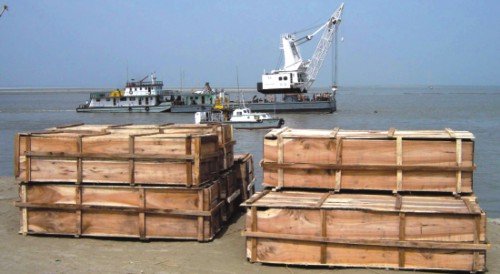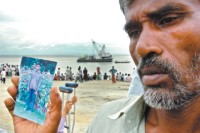|
Perspective
Launch Disasters
Tragedies that Can be Easily Avoided
Obaidur Rahman

On February 19 this year, the M.L Fahmida Happy Express capsized in the Kirtonkhola River near Beltala-Charabdani Kheya Ghat, Barisal with more than 100 passengers on board, after it was hit by a cargo vessel. The mishap cost the lives of around 40 individuals along with many who went missing after the accident. This is the first major launch capsize of this year and given the history and nature of the country's inland water transports, many fear that this won't be the last. There is a saying that amongst all forms of transport of the world, the ones on the rivers are thought be the safest and most enjoyable. The joyousness of such journey has always been a subject of school essays. But the unbelievable number of launch tragedies has changed a pleasant journey into one shrouded by fear. Passengers onboard launches these days are constantly fearful that they may have to face the same fate as many others who never reached their destination. A network of about 24,000 km of rivers, canals, creeks and haors covers Bangladesh and over 2000 big and medium-sized vessels are plying various routes covering more than 8,000 miles of these waterways of the country. At present 72 million passengers travel by inland waterways every year. And even though the number of vessels and the passengers have increased over the years unfortunately inadequate safety measures by the vessels' owners and the lack of sincerity of the authorities to safeguard the concerned citizens are chiefly to blame for such worsening of this crucial transport system of the country. Thousands of people have lost their lives in the ferry/launch disasters over the years and the damage estimated is in crores of our hard earned national currencies.
Even though the precipitating factors tends to be weather related experts say that the key reasons behind such horrific accidents include overloading, collision, failure to  undertake adequate safety measures, lack of modern navigation technologies, faults in design and construction of the vessels and unskilled skippers and sea-crews. From authorities end, misdemeanours include assisting vessel owners in obtaining fitness certificates through unfair means, poor inspection and monitoring procedures and corruption of massive proportion and intense politicisation of the inland transport community. But it is also often the case that Government institutions fall victim to the intimidation of these vessels' organisations. One study by the Ministry of Shipping once found out that 40% of the vessels were in poor shape and required immediate and crucial modifications. However, all the efforts of the betterment of these vessels were met with disappointment due to strong resistance from the launch owners who refused to pull out of the national maritime traffic. Again, in another incident the same ministry in 2003 imposed a rule forbidding ferries from commencing their journeys during the hours of 3 to 8 pm in the monsoon season (keeping in mind that storms in May and June are the most violent) however it was subsequently withdrawn when ferry operators protested. On the one hand the vessel owners' failure of prioritising safety on board while on the other the considerable collapse of the concerned authorities to ensure discipline in the inland water transport system, have resulted in creating deathtraps for the water bound commuters. We have witnessed the tragic testimonies of this over and over again. undertake adequate safety measures, lack of modern navigation technologies, faults in design and construction of the vessels and unskilled skippers and sea-crews. From authorities end, misdemeanours include assisting vessel owners in obtaining fitness certificates through unfair means, poor inspection and monitoring procedures and corruption of massive proportion and intense politicisation of the inland transport community. But it is also often the case that Government institutions fall victim to the intimidation of these vessels' organisations. One study by the Ministry of Shipping once found out that 40% of the vessels were in poor shape and required immediate and crucial modifications. However, all the efforts of the betterment of these vessels were met with disappointment due to strong resistance from the launch owners who refused to pull out of the national maritime traffic. Again, in another incident the same ministry in 2003 imposed a rule forbidding ferries from commencing their journeys during the hours of 3 to 8 pm in the monsoon season (keeping in mind that storms in May and June are the most violent) however it was subsequently withdrawn when ferry operators protested. On the one hand the vessel owners' failure of prioritising safety on board while on the other the considerable collapse of the concerned authorities to ensure discipline in the inland water transport system, have resulted in creating deathtraps for the water bound commuters. We have witnessed the tragic testimonies of this over and over again.
A lot has been said regarding these tragic incidents even though much hasn't been done to improve the situation. Every time an accident occurs where dozens of lives are lost the chain of events is quite predictable.
Two salvage vessels, Bangladesh Inland Water Transport Authority's (BIWTA) stationed in two separate places, take nearly two days to reach the accident site and commence the rescue activities. Meanwhile, the dead bodies start to surface and a small number of survivors tell their horrifying tales of survival. They point out that it was in fact, the sheer irresponsible behaviour of the capsized launch operator's end (may it be reckless driving or deliberate overloading of passengers doubling or even tripling the actual carrying capacity just to make a few quick bucks) that caused the accident in the first place. The relatives of the victims all assemble upon the shore and break down in tears when their worst fear sadly turns out to be true, the poor just got poorer. The authorities' show up, sometimes headed by ministers themselves and shower the survivors and victims' families with condolences and promises of bringing culprits under the wrath of justice, inquiry committees are formed. Insincerity prevails and the mishap is forgotten until the next one occurs.

To any sensible mind such disregard towards human lives is unacceptable. Millions of people all over the country use water transport for their voyage and it is their democratic right that their journey is safeguarded by both the vessel owners and concerned authorities. Time after time it has been strongly suggested that the inland vessels ought to be equipped with proper radio and radar instruments, adequate life jackets, life boats and other apt life saving appliances. Also, rare is the incident where the unscrupulous owners of the capsized launch and concerned authorities are brought to justice. In fact, once the public outcry over an accident eventually dies down, these perpetrators resume their misconduct. That's why it is of utmost importance that those vessel owners who are still carrying passengers in unfit vessels are brought to book immediately, along with the individuals from the concerned authorities who assist them in such misdemeanors. The passengers also need to educate themselves about safety measures and ought to stress on making sensible decisions that will guide them to take journeys that are instead of hasty and hassled. Lastly, effective and meticulous inspection and efficient monitoring is essential to ensure that no malpractice takes place and technical flaws like overloading and carrying of commercial cargos on the deck of passenger launches are sternly prohibited. The concerned authorities must do whatever is needed to keep passengers safe and to revive the lost charm of the journey by boat.
.Copyright
(R) thedailystar.net 2009
|
|
